- Vivaldi — The best web browser for MacOS that’s highly customizable, secure and loaded with features.
- Brave — The most secure web browser that’s efficient and easy to use.
- Chrome — The most popular browser globally, offering multiple extensions and integrations to Mac users.
- Safari — A lightweight, default browser for Mac that uses less RAM than other browsers.
- Firefox — A veteran browser with solid privacy and security features that safeguard your browsing activity.
- Opera – Loaded with built-in features because it strives to work without external add-ons.
- Edge — Second-fastest browser on the market, with fewer extensions than competitors.
Facts & Expert Analysis
- Most Efficient Pick: Vivaldi is our top choice since it’s safe and efficient, uses less RAM and can sync seamlessly across multiple devices.
- Best for Blocking: Brave is the most secure browser for Mac due to its advanced, built-in ad-blocking capabilities.
- Standard But Secure: Safari is more secure than Chrome but offers fewer extensions. Recent updates make it adequate for everyday users.
Everyone’s looking for a smooth and fast browser that doesn’t compromise their privacy or data security. Your computer’s default browser doesn’t always offer the best browsing experience, so it’s worth considering other options. If you’re a MacOS user and are looking for the best browser for Mac, we have seven great options for you to consider.
Show allLearn more about our editorial team and our research process.
-
05/29/2022
We have updated our list of the best browsers for Mac.
-
02/27/2024 Facts checked
Article rewritten to include up-to-date information about features and company news.
- updates
Cloudwards Editor’s Choice: Vivaldi
Vivaldi won this roundup of the best browser for Mac, especially since it recently launched the long-awaited iOS version. Our editorial team found it to be secure and loaded with features, and it seldom required extensions or add-ons.
Vivaldi is highly customizable, and we were able to sync our settings and customizations across devices. It’s ideal for both power and non-power users. Try it out for a seamless, secure and highly personalized browsing experience.
The Best Browser for Mac: Our Top 7 Choices
There are several browser options that you can try out for your Mac. You may be seeking one that offers the best security and speed. Maybe you’d like the fastest one that offers integrations with iOS tools. You may also want one with an appealing user interface and user experience. Our roundup of the top seven best browsers for Mac will help you settle on the best one for you.
1. Vivaldi — Best Browser for Mac
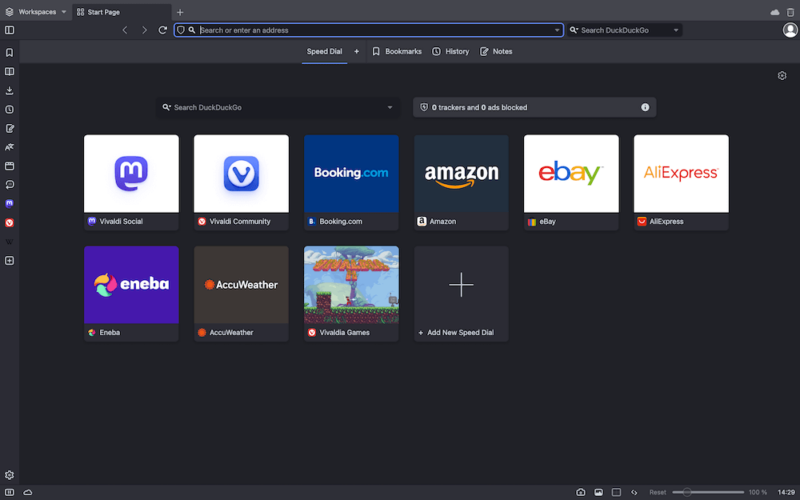
Pros:
- Highly customizable UI
- Tracker & ad blocker
- Android & iOS apps
Cons:
- Compatibility issues
- Slower than basic browsers
Vivaldi is a highly customizable browser that’s loaded with features and caters to both power and non-power users. You rarely need to add any extensions because of its extensive feature set. However, if you do need additional capabilities, you can access all the extensions available on the Chrome Web Store.
A Vivaldi account can accommodate multiple user accounts, allowing each user to keep their data and unique settings separate from the rest. You can also sync your browser data and settings across all your devices to switch between them seamlessly. You get basic cookie-blocking capabilities, and your data isn’t sent to Vivaldi’s servers or third parties.
One of the biggest downsides of using Vivaldi was the absence of an iOS version. That changed when Vivaldi launched its iOS browser in September 2023, elevating it from second place to first place on our list. Our Vivaldi review has more details about this effective browser.
2. Brave — Most Secure Browser for Mac
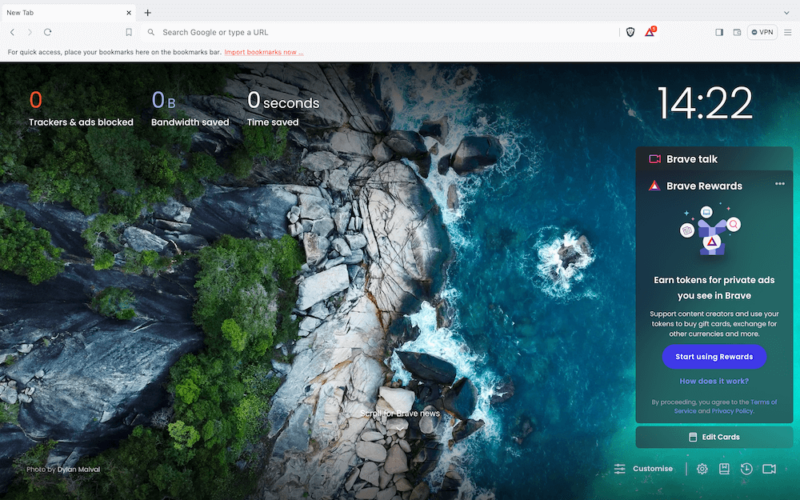
Pros:
- Memory efficient
- Ad blocker available
- Advanced privacy & security
Cons:
- Limited built-in VPN
- Infrequent updates
- Few site compatibility issues
Brave is a Chromium-based browser that offers more advanced security than Chrome and other browsers. It has a built-in ad, tracker and cookie blocker that ensures advertisers aren’t tracking your online activity. What’s more, the “forgetful browsing” mode automatically clears all cookies once you leave a site.
Brave runs its own advertising model that prioritizes user privacy more than other browsers do. Users can earn “Brave rewards” and get paid for watching ads. They can also choose which ads to watch, giving them a sense of control over the kind of marketing they view. However, Brave rewards are only accessible in a few geolocations.
Due to its ad-blocking capability, Brave interferes with the layout of some web pages, inhibiting their usability. It also gets fewer updates than its competitors, making it lag behind whenever new technologies emerge. Overall, we find Brave to be the most secure browser for Mac and deserving of the second-place ranking on our list. Our Brave review has more details.
3. Chrome — Fastest Browser for Mac
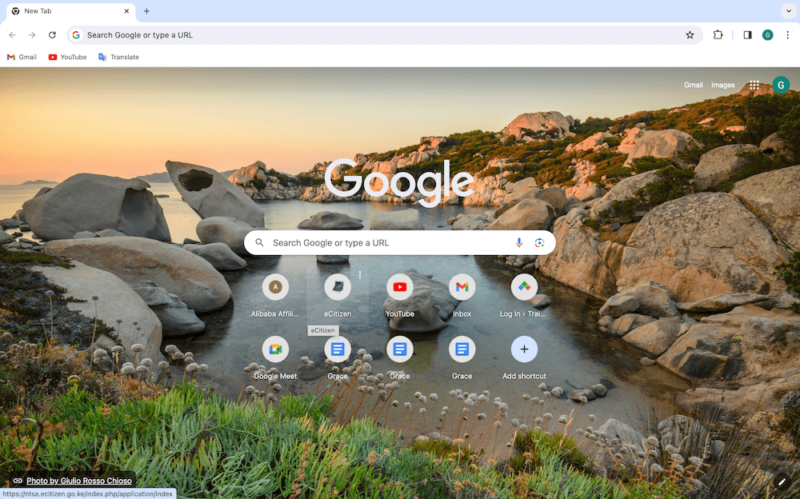
offering multiple extensions and integrations.
Pros:
- Efficient performance
- Minimalistic design
- Multiple extensions
Cons:
- Data & browsing concerns
- Few customization options
- Inefficient memory usage
Google Chrome is a lightweight, efficient browser that is easy to install and use. It’s one of the most commonly used browsers for Mac and other operating systems globally, offering multiple integrations and extensions. You can sync the browser between your Mac and iOS device using your Google account, making it easy to use across devices.
Chrome has a minimalist design that’s easy to use for kids, adults, pros and novices alike. It quickly loads web pages and has a “reading list” feature that downloads pages in advance for you to view while offline. Chrome’s software (Chromium) is the building block for many other browsers on the market, such as Opera, Vivaldi and Brave.
As we noted in our Google Chrome Review, it uses more RAM and CPU than other browsers despite recent updates, which affects other apps you need to use simultaneously. It has limited themes and customization options compared to competitors like Brave or Vivaldi. Google Chrome is notorious for tracking user activity. Your data is not safe and will likely end up in the hands of a third-party company.
4. Safari — Default Browser for Mac
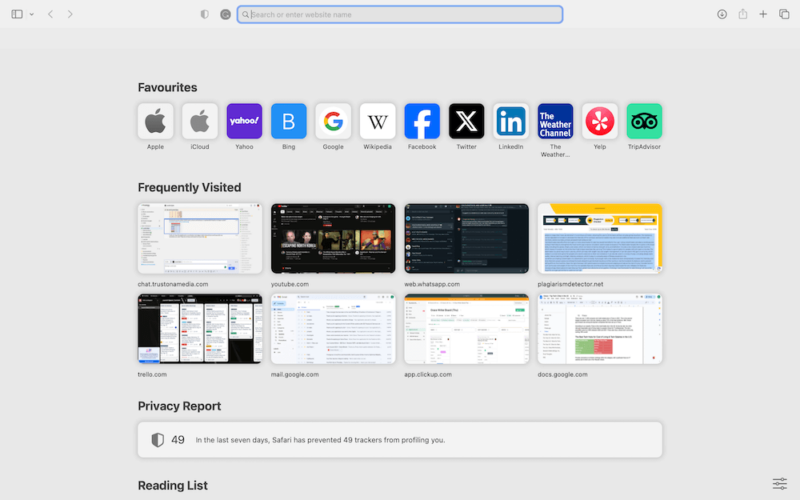
Pros:
- Lightweight user interface
- Advanced privacy protection
- Secure Apple Pay payments
Cons:
- Only on macOS & iOS
- Fewer customization options
- Limited extension options
Safari is the default browser for Mac and iOS and works seamlessly across Apple devices. It stores data in the cloud rather than on your device, helping save space on your gadgets. iCloud’s “private relay” makes it more secure than Chrome, as no single party can see the sites you visit or who you are — not even Apple. It also requires comparatively less RAM to run.
The iCloud “keychain” stores all your passwords in one place, eliminating the need to download a password manager extension. You can use touch ID to pay in online stores that accept Apple Pay. This means you no longer have to manually input your card details each time you want to make a payment. It’s also a more secure way to pay online.
Safari’s customization features are hard to find and less dazzling than open-source competitors like Firefox or Chrome. It also has fewer extensions. If you’re an Apple enthusiast who needs a simple browser for personal use, Safari is your best bet. However, if you’re a power user or into gaming, you may want to look elsewhere. Our full Safari review has all the details.
5. Firefox — Safe Browser for Mac
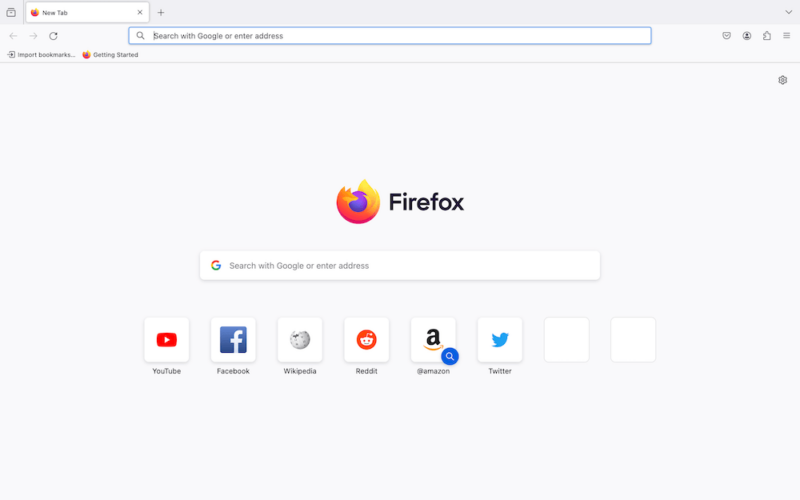
Pros:
- Vast add-on library
- Solid privacy & security
- Many customization options
Cons:
- Inefficient RAM usage
- Slower than competitors
- Incompatible with some web pages
Firefox uses malware protection to block cross-site tracking cookies, crypto miners, fingerprinting and social media trackers, making it a great choice for security-minded users. It keeps you safe from most ads and malicious trackers without compromising website functionality.
Firefox is the only major contemporary browser that’s not based on Chromium. Websites that use certain Microsoft technologies or nonstandard Google features may not be compatible with Firefox.
Our tests showed that Firefox’s RAM usage was high, but still only half as high as Chrome’s. The Quantum updates launched in 2017 transformed the browser’s design, reduced RAM usage and boosted browser speed. We tested Firefox against competing browsers in our Firefox review and found it to be slower than most, which is fine for basic browsing.
Firefox’s Mac and iOS versions are both easy to use and quite similar to each other. If the mobile version appears different from the desktop version, you can use the “request desktop site” feature to align them. You can also download several add-ons and extensions from the library to enhance Firefox’s functionality.
6. Opera — Browser With the Most Built-In Features

Pros:
- Multiple built-in features
- Fast & responsive
- Built-in ad blocker
Cons:
- Privacy & security concerns
- High RAM usage
Opera is a veteran browser that later adopted the Chromium base. It strives to be a browser that needs no extensions, so it comes loaded with all the essential features built in. If you can’t find what you need while using it, you can download extensions and add-ons to fill in the gaps. Its intuitive design makes it easy to use on Mac.
In our full Opera review, we tested its speed against that of other famous browsers and found it to be among the top three. However, Opera does take up a lot of your Mac’s RAM to reach those speeds. Only Android users have access to Opera Mini, which is lighter and prioritizes saving memory.
Opera has a built-in ad blocker, and you don’t have to download an extension for it like you do with Chrome. However, some privacy and security concerns have emerged with Opera — it uses less effective malware blockers than Google Safe Browsing. What’s more, several apps on Opera come from third-party developers, so your data will probably end up with them.
7. Edge — Second-Fastest Browser for Mac

Pros:
- Quick lookup feature
- PDF reader with markup
- Fast loading speeds
Cons:
- Fewer extensions
- Privacy concerns
- Cluttered homepage
Microsoft Edge is one of the fastest web browsers for Mac and other operating systems, coming in second behind Google Chrome. It has a lightweight design that uses less memory, cutting down on initial load time. Edge upgraded from Internet Explorer’s slow, stop-motion scrolling to a smoother motion to elevate the user experience.
Edge has an intuitive PDF reader that competes favorably with add-on readers like Javelin PDF Reader. When you highlight text or annotate it, it remains that way when you reopen the PDF reader.
There have been privacy concerns about Edge sharing user data with third parties like Facebook. It also collects data from Windows users even after they’ve restricted it on their browser. In addition, the curated news and other content shown on the feed after the homepage loads makes the browser seem cluttered.
You can download extensions from the Chrome Web Store onto Edge, but you’ll need to manually set them up before using them. Overall, it’s easy to use on Mac but is ideal for Windows users. You can find additional details in our full Edge review.
Final Thoughts
These seven best browsers for Mac offer a smooth browsing experience depending on the use case. We prefer Vivaldi or Brave because of their strict security policies, effective ad blockers, efficient RAM usage and seamless browsing experience. They are also easy to use and have a minimalistic design with no clutter.
Chrome outperformed Safari due to its multiple extensions and seamless integration with a myriad of third-party apps. However, Safari is more secure than Chrome and works just fine for non-power, everyday users. Firefox, Opera and Edge are also effective and worth trying out.
Which browser have you been using on your Mac? What makes you want to find a new browser? Which of the seven browsers listed here do you consider the best for your Mac? Let us know in the comments, and thank you for reading.
FAQ: Mac Browsers
- Is Safari or Chrome Better for Mac?
Chrome is better for Mac because it offers many more integrations and extensions than Safari does. However, if you’re an Apple product enthusiast who’s not a power user, the updated version of Safari will do just fine.
- Which Is the Preferred Browser on Mac?
Vivaldi is the preferred browser on Mac because it is fast and secure, has efficient RAM usage and allows you to sync browser data and settings across devices.
- Which Is the Fastest Browser on Mac?
Chrome is the fastest browser on Mac, closely followed by Edge.
- Which Is the Best Browser to Use on Mac?
The best browser to use on Mac is Vivaldi. It’s great for both power and non-power users, has great data security and offers a seamless browsing experience across synced devices.
The post The 7 Best Browser for Mac in 2024: Safari, Chrome, Firefox & More appeared first on Cloudwards.
 9 months ago
105
9 months ago
105


